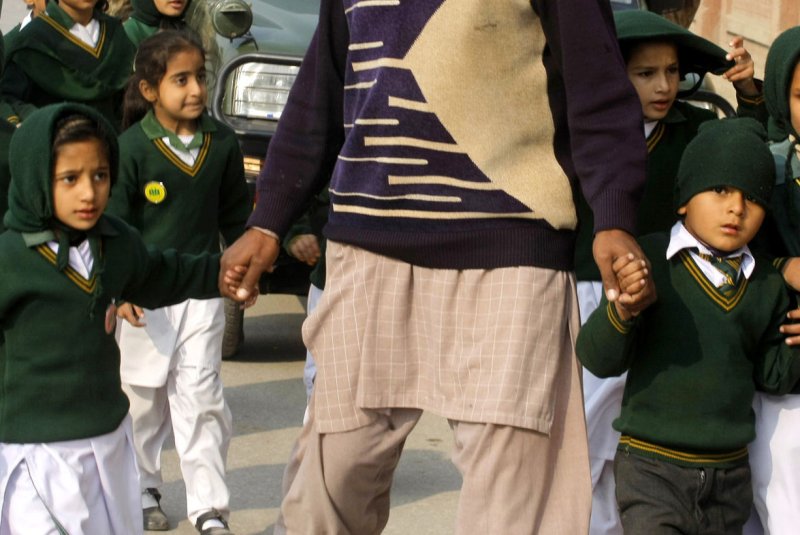1 of 8 | Students are escorted from the Army Public School in Peshawar, Pakistan, after an attack by Taliban gunmen on Dec. 16, 2014. Many of the children who survived are traumatized. File Photo by Sajjad Ali Queshi/UPI |
License Photo
PESHAWAR, Pakistan (News Lens Pakistan) -- Khyber Pakhtunkhwa province in Pakistan's northwest is running a weapons training program for students, teachers and lower-level staff in response to the December attack on the Army Public School in Peshawar.
Provincial Information Minister Mushtaq Ahmad Ghani announced Jan. 13 that teachers and other staffers would be allowed to keep their own guns while at school so they could hold off militants until police arrived. They will receive training in proper use of the weapons.
The government, he said, wants to improve security at 35,000 public schools, colleges and universities. He said the province's 65,000 police officers cannot secure all those facilities.
The December attack left more than 100 children and staff dead, and 126 others wounded. The Tehreek-e-Taliban Pakistan claimed responsibility for the attack.
Saleem Marwat, district police officer in Swat, northeast of Peshawar, said police would train 2,000 watchmen as part of the program to use guns, but emphasized that protection of schools and students would not be left solely to them.
"The police and army are in the region, and on a quick response we can come for the security of children and teachers," he said during a training session.
According to the Khyber Pakhtunkhwa police department, 10,727 school security guards were to be trained in the first quarter of this year across the province while 10,610 more guards are awaiting training.
In addition, eight female teachers from the Frontier College for Women, a government college, received training in using guns.
Samiullah Jan, 27, a watchman in a government school in Swat was one of the trainees.
"I had seen guns, but hadn't fired one. It's the first time I fired one. Now if God willing, I will be ready to confront the rivals attacking my school," he said.
The fear of another school attack persists, but weapons training may not help parents and children who fear schools are unsafe.
Eleven-year-old Ikhtiar, a student of Warsak Model School and College next to the Army Public School, is being kept home from the school by his mother, who he said became scared after the December attack.
"I think of myself, how I should get myself escape if such thing happens in my school," he told News Lens Pakistan. Ikhtiar is reluctant to show his fear but when he goes outside at night he asks an elder to accompany him.
His mother, though, is even more concerned that schools could be a target since hearing about the weapons training initiative and the fact that teachers would now be armed.
"These schools can be attacked again, so my children are dearer to me than their studies," Rukhsana Muqqadas Khan said. "I would like to find a low-profile school in the neighborhood where my children would keep on their studies.
"Things are changed now we see school teachers are trained to use guns, so how would we believe that our children at school are safe?" she said.
There is also criticism that arming guards and teachers is not a solution to the security problem.
Muhammad Ali Babakhel, Deputy Inspector General of Police in Khyber Pakhtunkwa, told News Lens, "I think we as a society shall work for deweaponization instead of proliferation of weapons.
"Teachers are supposed to teach. The state is supposed to provide a secure environment. If every person is to secure and defend his life and property then it's anarchy and not a state," security analyst Saad Muhammad, who recently retired from the Pakistan army, told News Lens.
Erum Irshad, head of the University of Peshawar's psychology department, said the attack on the Army Public School, the barbed wire on school boundary walls, armed staff and the gun training are all affecting the personalities of children.
Irshad, who also works as a psychotherapist in Peshawar and has treated children, said the fear and anger can lead to post-traumatic stress and depression in children.
She said they need psychotherapy and meditation.
"I went and observed the schoolchildren. Most of them are shocked with the news they have lost their friends," she said, adding that one such student is now unable to even talk.
With the passage of time, they will recover if they get better care, she said.
"In such a traumatized situation, we need psychologists to treat these children; I don't think army has enough teams and human resources in this regard."















